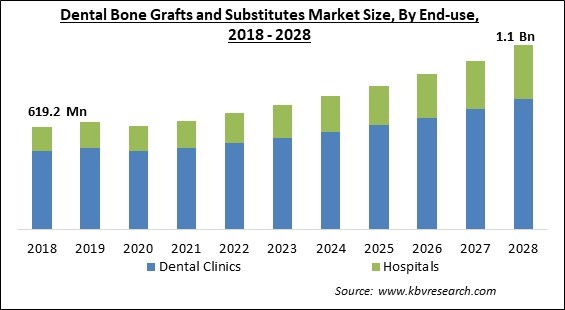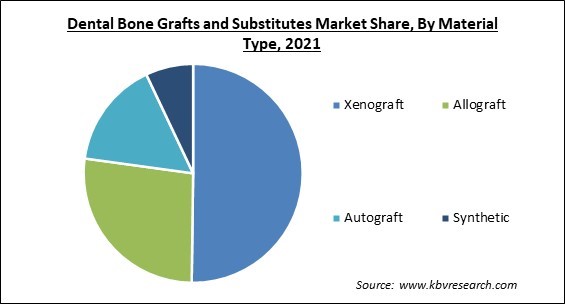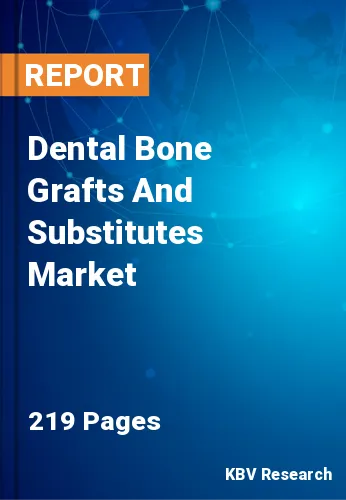The Global Dental Bone Grafts And Substitutes Market size is expected to reach $1.1 billion by 2028, rising at a market growth of 8.0% CAGR during the forecast period.
Increasing the quantity of bone in a portion of the jaw wherein bone has been lost or where greater support is required is done via a dental bone transplant operation. It is possible to surgically fuse new bone to the jaw's existing bone by removing bone from another part of the body. Synthetic bone material is sometimes utilized.

When further operations, such as dental implants, are required or when bone loss is threatening the health of the gums and teeth nearby, a dental bone transplant may be required. Dental bone grafting may be carried out in a number of methods, but the fundamental steps are always the same. In order to graft (attach) more bone material to the jaw, a dentist or oral surgeon creates an incision in the jaw.
If a person has gum disease or has lost one or more adult teeth, a dental bone transplant is often performed. Loss of jawbone tissue may result from any of these disorders. The use of the patient's own bone from the tibia, hip, or rear of the jaw is the preferred method for dental bone grafting. It's referred to as an autograft.
Autografts are often the "gold standard" because they strengthen jawbone support, hasten to heal, and promote the growth of new bone. Dental bone transplant candidates often have lost teeth that will be replaced with implants. Dental implants are synthetic roots inserted into the jawbone that resemble screws. The implant is subsequently covered with a crown that matches the neighboring teeth.
In addition, owing to the global lockdown limits put in place, end users including hospitals and clinics noticed a decrease in patient visits. Additionally, healthcare workers delayed less crucial treatments during the pandemic because of the increasing load of COVID-19 therapy. However, given that governments have begun easing global standards for restarting economic activity, the situation is anticipated to become better. Additionally, with the resumption of elective operations and procedures in the near future, the need for bone grafts and replacements is projected to rise.
Dental aesthetic operations have increased dramatically as a result of the coronavirus epidemic and the quick rise in remote conferencing and virtual meetings. The development of aesthetic dentistry has increased our understanding of dental health. Enhancing both one's appearance and sense of wellbeing, it has contributed to a complete sense of wellbeing. The permanent facial changes made possible by technological improvements in cosmetic dentistry far outweigh the correction of crooked teeth.
The rapid rise in dental cavities, tooth loss, and caries among individuals as a result of bad eating habits is one of the key causes behind the expansion of the dentures industry. Additionally, every country is seeing a sharp rise in the number and proportion of its elderly population. The Global Oral Health Status Report of the World Health Organization from 2022 estimates that there are over 3.5 billion individuals worldwide who suffer from oral illnesses.
When someone decides to have a dental bone transplant, there are dangers associated, just like with any form of surgical operation. There are extremely few infections linked to bone grafting treatments. If a patient contracts an infection, antibiotics will be prescribed in order to treat the illness. This is only one of the numerous factors that make selecting an expert dentist so important for those getting dental bone grafts.
Based on material type, the dental bone grafts and substitutes market is classified into autograft, allograft, xenograft, and synthetic segments. In 2021, the synthetic segment acquired a substantial revenue share in the dental bone grafts and substitutes market. Its increased osteoconductivity, hardness, and improved acceptance are responsible for the growth. There are many different kinds of synthetic materials on the market, including ceramic, polymer-based, BMPs, and others. Synthetic grafting has a lower risk of disease transmission than xenograft and allograft, which promotes growth even more.

Based on application, the dental bone grafts and substitutes market is divided into ridge augmentation, sinus lift, implant bone regeneration, socket preservation, and periodontal defect regeneration. In 2021, the socket prevention segment held the largest revenue share in the dental bone grafts market. It is a technique used to lessen bone loss after tooth extraction from an alveolar bone tooth socket. This kind of transplant is inserted into the tooth socket right away after extraction. It prevents the sidewalls of the socket from collapsing and fills the space left by the lost tooth.
Based on end-use, the dental bone grafts and substitutes market is segmented into dental offices and hospitals. In 2021, the dental clinics segment witnessed the maximum revenue share in the dental bone grafts and substitutes market. Due to their convenience and simple accessibility of surgeons, clinics are becoming more and more popular as the number of dental graft procedures conducted each year increases. These clinics are more skilled than hospitals in providing same-day operations that are speedier and safer. There are several private dental clinics and specialized clinics, many of which have trained doctors that specialize in bone grafting operations.
| Report Attribute | Details |
|---|---|
| Market size value in 2021 | USD 659.3 Million |
| Market size forecast in 2028 | USD 1.1 Billion |
| Base Year | 2021 |
| Historical Period | 2018 to 2020 |
| Forecast Period | 2022 to 2028 |
| Revenue Growth Rate | CAGR of 8% from 2022 to 2028 |
| Number of Pages | 219 |
| Number of Tables | 370 |
| Report coverage | Market Trends, Revenue Estimation and Forecast, Segmentation Analysis, Regional and Country Breakdown, Companies Strategic Developments, Company Profiling |
| Segments covered | Material Type, Application, End-use, Region |
| Country scope | US, Canada, Mexico, Germany, UK, France, Russia, Spain, Italy, China, Japan, India, South Korea, Singapore, Malaysia, Brazil, Argentina, UAE, Saudi Arabia, South Africa, Nigeria |
| Growth Drivers |
|
| Restraints |
|
Based on geography, the dental bone grafts and substitutes market is classified into North America, Europe, Asia Pacific, and LAMEA. With the highest revenue share in the dental bone grafts and replacements market in 2021, North America took the top spot. Growth is being fueled by an expanding target market and an expanding number of dental implant procedures in this area. Due to the relatively high-income levels in this area, consumers can easily afford these pricey cosmetic operations, which is further projected to promote market growth.
Free Valuable Insights: Global Dental Bone Grafts And Substitutes Market size to reach USD 1.1 Billion by 2028
The market research report covers the analysis of key stake holders of the market. Key companies profiled in the report include Medtronic PLC, Zimmer Biomet Holdings, Inc., Dentsply Sirona, Inc., Stryker Corporation, Institut Straumann AG, BioHorizons, Inc. (Henry Schein, Inc.), RTI Surgical, Inc., Geistlich Pharma AG (The Geistlich Group), Collagen Matrix, Inc. (Linden Capital Partners), and Dentium Co., Ltd.
By End-use
By Material Type
By Application
By Geography
The global Dental Bone Grafts And Substitutes Market size is expected to reach $1.1 billion by 2028.
Upgrading Aesthetic Dental Treatment are driving the market in coming years, however, Potential Hazards Of Bone Grafting restraints the growth of the market.
Medtronic PLC, Zimmer Biomet Holdings, Inc., Dentsply Sirona, Inc., Stryker Corporation, Institut Straumann AG, BioHorizons, Inc. (Henry Schein, Inc.), RTI Surgical, Inc., Geistlich Pharma AG (The Geistlich Group), Collagen Matrix, Inc. (Linden Capital Partners), and Dentium Co., Ltd.
The expected CAGR of the Dental Bone Grafts And Substitutes Market is 8.0% from 2022 to 2028.
The Xenograft segment acquired maximum revenue share in the Global Dental Bone Grafts and Substitutes Market by Material Type in 2021 thereby, achieving a market value of $541.3 million by 2028.
The North America market dominated the Global Dental Bone Grafts and Substitutes Market by Region in 2021, and would continue to be a dominant market till 2028; thereby, achieving a market value of $434.7 million by 2028.
Our team of dedicated experts can provide you with attractive expansion opportunities for your business.

